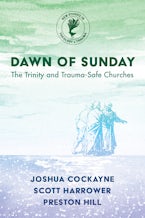Series Editors:
Scott Harrower, Preston Hill, Joshua Cockayne, and Chelle Stearns
Series Description:
New Studies in Theology and Trauma is a series of entry-level monographs in Christian theology engaging trauma. The series showcases work at the intersection of trauma and theology from emerging scholars in this new discipline. Each volume will be approximately 60,000–80,000 words long according to the topic at hand. Monographs in the series are aimed at exploring: (i) how trauma studies and trauma theory can inform theological method, (ii) how theology can be used as a frame for understanding trauma, (iii) how churches and faith communities can facilitate theologically informed, effective trauma care.
Recent neuroscience has confirmed that surviving traumatic violence leaves lifelong scars in the brain and body, and that “the body keeps the score.” This persistent reality of trauma poses a unique challenge to Christian communities and churches. Thankfully, many of these communities have begun to recognize that trauma and abuse do not happen “out there” but are horrors that occur within our own ranks, with many Christians calling out for justice for victims that have hidden in the shadows far too long. Christians cannot avoid confronting trauma that is tragically manifesting within our own church communities. When trauma is perpetrated by pastors and Christian leaders, this threatens to undermine a Christian witness to the gospel. As a result, trauma is raising the stakes on theological truth-claims made by Christians. This leaves a door wide open for Christians to explore the intersection of theology and trauma.
Given the emerging state of literature on theology and trauma currently, there is a need to solidify the intuitions shared by scholars in the many disciplines of theology and biblical studies and signal a constructive and generative approach for the future of this growing field. The present series seeks to fill this need by offering a series of monographs grouped around a double-witness: a witness to the laments and losses involved in surviving trauma and a witness to God’s ongoing presence and agency in the aftermath of violence. By promoting a double-witness approach in this series, authors engaging theology and trauma will be provided a coherent and fruitful platform for witnessing both the wounds of trauma and the healing in recovery for communities today.
We have started this series because trauma calls for faithful and generative witness, which is why we have selected the Australian lyrebird as the symbol for our series. The lyrebird is able to listen carefully to sounds of its surroundings, then repeat these back in concert with new voices as part of a broader song. This new song is unique in that it faithfully reflects the original sounds into a new context of richer harmony. Likewise, empathetic listening that faithfully witnesses the wounds of trauma while remaining open to renewed hope within a larger frame is the core idea of the New Studies in Trauma and Theology Series.
Showing results 1-3 of 3
Filter Results OPEN +





